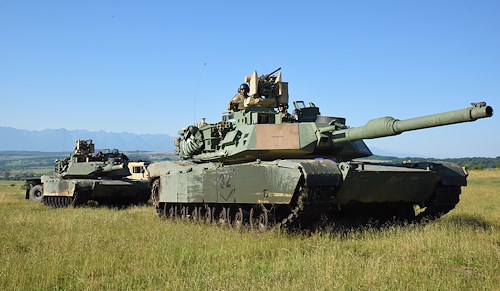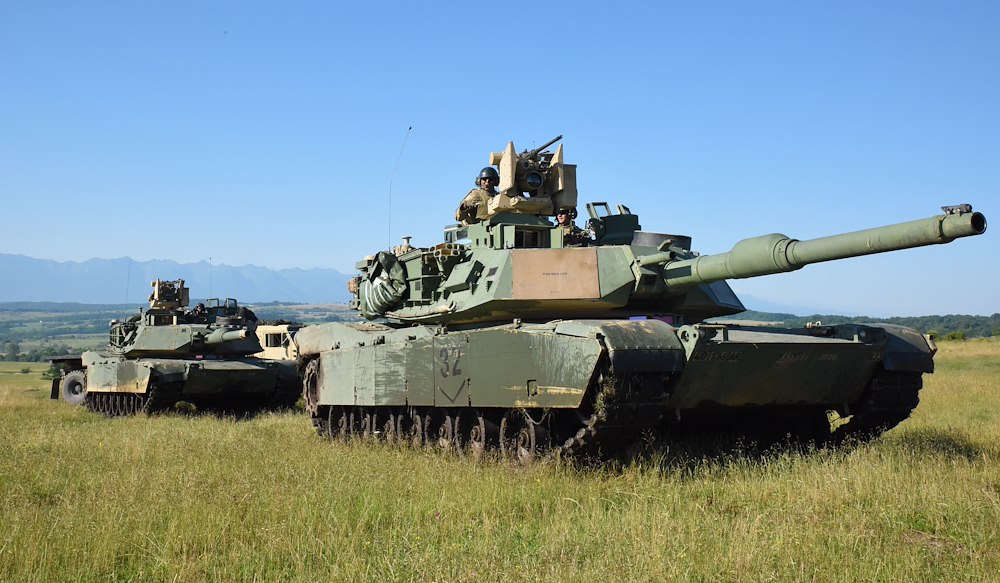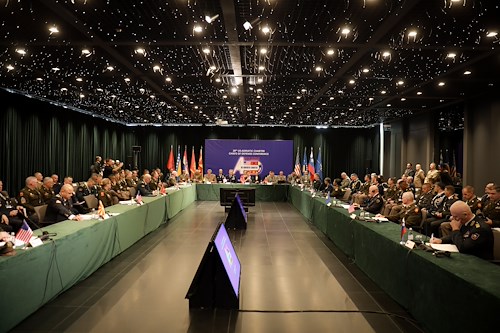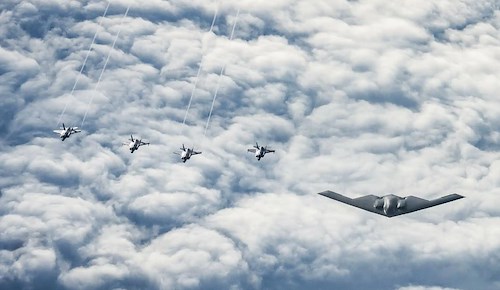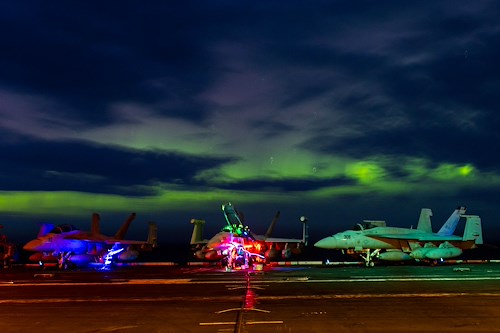Gallery contains 3 images
×
Photo 1 of 3
Getica Saber 2017 Exercise Participants Practice Collective Defense
CINCU, Romania - U.S. Army Soldiers of 1st battalion, 66th armored regiment, 3rd Armored Brigade Combat Team set up their M1 Abram Tanks during Getica Saber 17, July 10, 2017. Getica Saber 17 is a U.S-led fire support coordination exercise and combined arms live fire exercise that incorporates six Allied and partner nations with more than 4,000 Soldiers. Getica Saber 17 runs concurrent with Saber Guardian 17, a U.S. Army Europe-led, multinational exercise that spans across Bulgaria, Hungary and Romania with more than 25,000 service members from 22 Allied and partner nations.
Photo 2 of 3
Getica Saber 2017 Exercise Participants Practice Collective Defense
CINCU, Romania - U.S. Army Soldiers of 1st battalion, 66th armored regiment, 3rd Armored Brigade Combat Team speaks with Soldiers of the Romanian army during Getica Saber 17, July 10, 2017. Getica Saber 17 is a U.S-led fire support coordination exercise and combined arms live fire exercise that incorporates six Allied and partner nations with more than 4,000 Soldiers. Getica Saber 17 runs concurrent with Saber Guardian 17, a U.S. Army Europe-led, multinational exercise that spans across Bulgaria, Hungary and Romania with more than 25,000 service members from 22 Allied and partner nations.
Photo 3 of 3
Getica Saber 2017 Exercise Participants Practice Collective Defense
CINCU, Romania - U.S. Army Soldiers of 1st battalion, 66th armored regiment, 3rdArmored Brigade Combat Team setup their M1 Abram Tanks during Getica Saber 17, July 10, 2017. Getica Saber 17 is a U.S-led fire support coordination exercise and combined arms live fire exercise that incorporates six Allied and partner nations with more than 4,000 Soldiers. Getica Saber 17 runs concurrent with Saber Guardian 17, a U.S. Army Europe-led, multinational exercise that spans across Bulgaria, Hungary and Romania with more than 25,000 service members from 22 Allied and partner nations.
CINCU, Romania, July 13, 2017 — Booming mortar blasts broke the mountain valley’s silence as Romanian and U.S. artillery fired opening rounds at the July 10 commencement of the annual joint combined training exercise Getica Saber 2017 here.
The exercise, which runs until July 15, is one of 18 “Black Sea Region Exercises” that U.S. European Command conducts annually with partner nations in Central and Eastern Europe to bolster collectivedefense.
Paladin mobile artillery launchers and M142 High Mobility Artillery Rocket Systems launched coordinated rounds of fire. They were practicing joint fire-cover that would protect infantry or armor units in a combat situation.
Integrating, Synchronizing
“What we’re really working on is integrating and synchronizing the delivery of joint fires and combined fires in support of a brigade combat team. As the brigade combat teams carry out their maneuvers, they will rely on the artillery to provide backup support and defend them from enemy ground attacks,” said Army Col. Kelly Webster, commander of the 1st Cavalry Division Artillery Brigade.
The American military has focused on fighting terrorist and insurgent groups over the last 16 years. But Eucom and its NATO allies and partner nations are preparing in case a conventional conflict occurs in Europe.
Regional Aggression weighs heavily on regional military leaders’ minds since the 2014 Ukraine crisis. They look to exercises like Getica Saber to boost their collective defensive capacity.
“For the last 16 years, we’ve been working in an environment where we controlled the airspace, without any ‘near-peer’ threats that challenged that control. We have to be prepared to encounter near-peer threats in the future, and we need to be able to deflect any air-based threats,” said Army Capt. John Strickland, a public affairs officer with the 7th Mobile Public Affairs Detachment.
He added, “It’s about preparing to fight an enemy that has similar capabilities to what we bring to the table.”
Getica Saber’s planners anticipate a future enemy with extensive ground-based firepower, Strickland said. The U.S. and its allies, he added, would employ combined fires in this scenario to take out not only enemy artillery and armor, but also anti-aircraft launchers that threaten friendly aircraft.
"If we’re facing an enemy that has surface-to-air capability, we need to defeat that capability to get our infantry into the area," he said. "We need to protect the aircraft that are out there transporting or supporting the ground troops."
The 1st Cavalry Division Artillery Brigade is overseeing Getica Saber’s live-fire exercise, he said. Joining them is the 4th Infantry Division’s 3rd Armored Brigade Combat Team, which will head up a combined-arms live-fire exercise consisting of tanks and artillery later in the exercise.
U.S., European Partnership
Romanian artillery units are participating in both exercises, Webster noted. He added that the Romanian army’s Second Infantry Division is overseeing Getica Saber and day-to-day administrative management. The Romanian military leadership is working with U.S. leaders in shared office space inside the Combat Training Center here.
Merging office space with the Romanian command for the exercises fosters interoperability, Webster said. Differences exist between U.S. and Romanian hardware and computer network systems, he said, but working in proximity makes it easier to quickly resolve any technical difficulties.
“Having combined our headquarters and theirs into one headquarters, we can both operate our computerized systems in a very timely manner,” he said. “It’s a very efficient workaround that we’ve found since we’ve started the exercise.”
The exercise involves less digital technology and fewer network-connected systems than other U.S.-based exercises frequently have, which is beneficial, said Timothy Lemley, lead planner for Saber Guardian 2017, another Black Sea-area exercise that runs concurrently with Getica Saber.
Lemley pointed out that if a wartime adversary uses cyberattacks to sabotage weapons systems, U.S. and allied troops will need to be prepared to fight in “analog” mode.
“If we look towards sort of the future warfare aspect of things, we’re looking at all kinds of area-of-denial, computer denial and denial-of-service attacks, where we might have to operate in an analog environment,” he said. “So, working with these countries that work primarily in an analog environment gives us the opportunity to experience that.”

